
Zimbabwe's President Robert Mugabe.
The world is unlikely to recognize the result of Zimbabwe's single-candidate runoff election, and many voters will cast a ballot simply because they fear the painful consequences of refusing to do so. But as of late Thursday, all signs were that Robert Mugabe's regime will stage an electoral farce on Friday. The runoff was necessitated by the fact that Mugabe's electoral commission declared that the incumbent had finished second in the March 29 presidential vote, but that the man who won that race — opposition leader Morgan Tsvangirai — had fallen just short of a majority. But the campaign of systematic violence and repression against his Movement for Democratic Change, and the regime's repeatedly insistence that it will remain in power regardless of the election's outcome, prompted Tsvangirai to withdraw his candidacy. Neighboring countries have urged Mugabe to postpone the vote until a credible democratic process can be assured, but the man who has run Zimbabwe for 28 years is having none of it. Addressing supporters on Thursday, Mugabe said: "We have some of our brothers in Africa making that call [to postpone the vote]. We have refused to do so."
In an Orwellian twist, the security services and militias that have, for months, been trying to intimidate opposition voters into staying away from the polls now plan to force them to vote — for Mugabe. An officer with the security services said his men and members of the ruling Zanu-PF party would mount an operation codenamed "Wavhotahere" ("Have You Voted?") to counter opposition calls for a boycott. Zimbabwean voters' fingers are marked with indelible ink at the polls to prevent repeat voting, and the officer warned that soldiers, police and party militants would march anyone found without the ink-stain to the nearest polling station.
In Chitungwiza, a dormitory suburb near Harare, pro-Mugabe militias warned residents to attend an all-night Zanu-PF meeting before being escorted to the polling station on Friday morning. Some 64,000 postal ballots have already been cast by members of the security services, and several reports indicate that rank-and-file soldiers and police officers were forced to vote in front of their superiors.
Despite threats against those who don't show up to vote for Mugabe, some MDC supporters remained defiant. Getrude Chisango of Sunningdale said: "I'm not going to vote because I wanted Tsvangirai. I'm staying indoors on election day." But such courage won't prevent Mugabe from clinging to power.
With the election hopelessly rigged against him, Tsvangirai has been forced to look abroad for redress. Mugabe's tactics have been unanimously denounced around the world, from the U.N. Security Council and the European Union to the African Union and South Africa's ruling African National Congress (ANC). "Compelling evidence of violence, intimidation and outright terror; the studied harassment of the leadership of the MDC, including its Presidential candidate, by the security organs of the Zimbabwean government; the arrest and detention of the Secretary-General of the MDC; the banning of MDC public meetings; and denial of access to the Zimbabwe Broadcasting Corporation, all have convinced us that free and fair elections are not possible in the political environment prevalent in Zimbabwe today," said an ANC statement this week.
But despite the outrage and threats of diplomatic isolation and economic sanctions, Mugabe seems unlikely to change course. Those in Mugabe's inner circle have managed to amass vast wealth even as Zimbabwe's legitimate economy imploded, which suggests that sanctions directed at the economy will have limited impact on the regime's behavior. Chris Maroleng, Zimbabwe expert at the International Institute for Strategic Studies, based in Pretoria, said the only way forward was for the international community to end its cathartic but counter-productive denunciations of Mugabe, and back Mbeki's attempts to broker a compromise between the regime and the opposition. "The international community has begun speaking with one voice on Zimbabwe," said Maroleng. "Mugabe is immune to international pressure. The only chance is diplomatic negotiations through Mbeki."
Maroleng predicted that following Friday's poll, the security forces will seek to eliminate all dissent. For some in the MDC, that means there's little left to discuss. Party spokesman Roy Bennett, based in Johannesburg, for example, said, "We have a completely dictatorial regime of thugs ruling the country by force. Only force will remove it. And if the people of Zimbabwe had the support from the outside world that they need, they would rise up. But you can't remove a regime like that by throwing stones." But MDC figures inside Zimbabwe, including Tsvangirai, have dissociated themselves from calls for violence or armed intervention — if they were to endorse such calls, of course, they would run the risk of being charged with treason, a capital offense. Still, the idea of a more forceful response finds backing in some surprising quarters. "If the carrot doesn't work," Nobel Peace laureate Archbishop Desmond Tutu told TIME on Thursday, "maybe the stick?"
—With reporting by correspondents inside Zimbabwe
